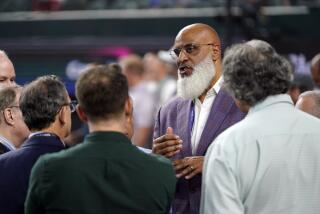Sides Dig In as Lockout Enters Third Week
- Share via
NEW YORK — Management’s chief negotiator said Wednesday he thought positions were hardening in baseball’s labor dispute and that the union was trying to “win” the negotiations.
The spring training lockout completed its second week on Wednesday, the official reporting date for all players. Chuck O’Connor, executive director of the owners’ Player Relations Committee, said clubs thought the latest spring training could start without delaying the regular season would be about March 12.
“We have worked generally on the idea of generally three weeks,” O’Connor said. “I’m not aware that we have precisely set a date.”
Union chief Donald Fehr, still in Phoenix following a meeting of the players executive board, said he had only minor contact with management on Wednesday, and said the next move was up to the owners. He is scheduled to brief players in Los Angeles today and in Tampa, Fla., on Friday.
“I chatted with Steve Greenberg this morning very briefly just to let him know where I’m going to be the next few days,” Fehr said, referring to the deputy commissioner.
Talks have stalemated over eligibility for salary arbitration; the union wants it rolled back to two years while management insists that it remain at three years.
Talks broke off Monday and O’Connor said he hoped negotiations could resume on Monday. Fehr said there currently was nothing to talk about.
“It takes somebody coming up with a new idea or concept, or further discussions that point people in a direction they haven’t been or puts things in a different light,” he said when asked what it would take to restart negotiations.
Following Tuesday’s meeting of 100 players--nearly one-tenth the union membership--most players said they could not accept a compromise on salary arbitration.
“There probably has been a hardening of positions. I’d be less than candid if I didn’t tell you that,” O’Connor said. “When you put things on a win-lose basis, you almost invite that response.”
Commissioner Fay Vincent said he spent last weekend attempting to find a compromise solution, but that the union said it would not move off its demand for a rollback to two years.
“I think that when owners read a headline that says, ‘Baseball Players Say They Won’t Concede,’ they say, ‘If they won’t concede, we won’t concede,’ ” O’Connor said. “When you say, ‘We won’t compromise’ or ‘We won’t concede’ or ‘It has to be our way,’ you have to expect the reaction from the other side has to be just as hard.”
Fehr, when told of O’Connor’s comments, said he did not interpret the situation as hardening.
“I don’t think there was any change at all,” said Fehr, who traveled from Phoenix to Los Angeles on Wednesday night. “If he has any question about what our position is, he can call me.”
O’Connor, a veteran of many labor negotiations but a rookie in baseball talks, said he believed gaining an appearance of victory had become important for the union.
“This has been . . . put on a win-lose basis,” he said. “That’s really not the way to conduct labor negotiations. . . . Winning and losing are concepts that are great for baseball and other sports but they are not typically useful in labor negotiations.”
More to Read
Are you a true-blue fan?
Get our Dodgers Dugout newsletter for insights, news and much more.
You may occasionally receive promotional content from the Los Angeles Times.








